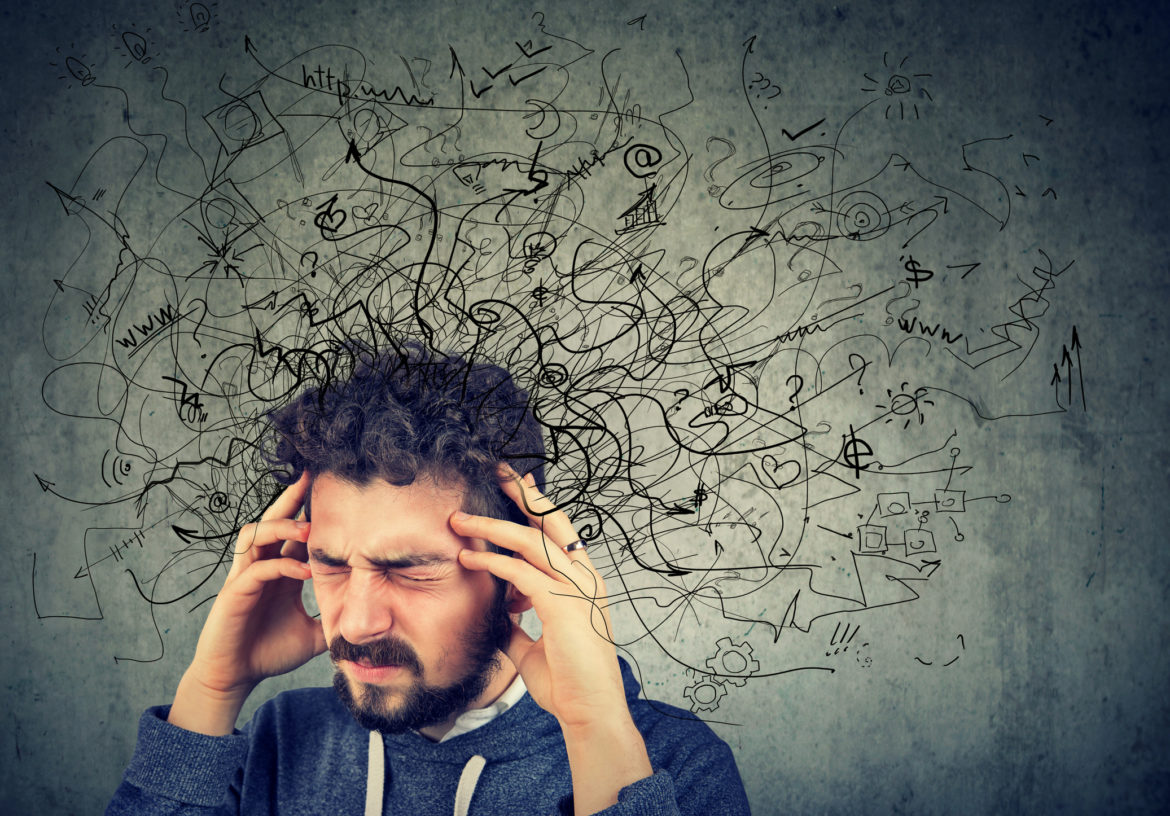What is Anxiety?
Anxiety disorders all have unrealistic, irrational fears or anxieties of disabling intensity as their principal and most obvious manifestations.
Anxiety
- Is characterized by unrealistic, unfounded fear and worry.
- Appears to have biological causes.
- Is a complex blend of unpleasant emotions and inappropriate cognition (or self talk).
- Is more oriented to the future and much more diffuse than fear.
- Worry can be real or imagined.
Distress vs. Eustress
Being worried about real things performs a needed function in our lives . It can lead to action and positive results and gives us a high (Eustress) or needless worry (Distress), which is often harmful, adding unwanted stress and even health risks to our lives.
Worry

- Unnecessary worry (anxiety) hurts.
- It is cumulative.
- It builds up in our body and is stored as stress.
- The trick is knowing one from the other and learning to deal with both.
- 95% of what we worry about never happens.
Imagination can litter our internal environment with every manner of fearful possibility, many of which do not exist out side of our fertile imaginations. They trigger the same damaging chemical and physical changes as a genuine emergency.
Stress

Generally speaking stress is the accumulation of anxiety. Resiliency is the capacity to manage and survive one’s life events. (stress)
It has been well documented over the years that anxiety and anger (which are in different parts of the brain) are linked and one can affect the incidence and presence of the other very easily.
Stress may not be necessarily traumatic, but it can comprise a combination of factors that build up over time, gradually eroding our resilience and productivity.
Prolonged exposure without adequate rest or relaxation can eventually have devastating results. Many people end up in extreme difficulty because they fail to spot the accumulating warning signs at an early stage.
The scale of the events themselves (were they life threatening) or the circumstances of our life when they occurred (were you already stressed by other factors) are things to be aware of.
Perhaps the most crucial indicator of how we deal with stress and trauma is the quality of our coping strategies. The more effectively we are able to respond to stress, and minimize the anxiety that comes along with it, the more resilient we will become.
The key to managing stress
- That which we stuff, suppress and push down out of our awareness, we magnify.
- The key to managing stress is to become aware of the emotion, name it, (mad, glad,happy, sad, fear etc.) challenge it
- (Is it true or imagined) Tell yourself the truth.
- Do what you know is true and right.
- Practice healthy coping strategies.
- That which we push down out of our awareness, we magnify.
- The key to managing stress is to become aware of it.
- Practice healthy coping strategies
- Use healthy appropriate self talk
It is almost impossible to predict how one person will respond to stress and trauma at any particular time. Some people are capable of dealing with tremendous pressure and can even thrive on it. Others, however, will find themselves overwhelmed by apparently trivial developments.
The most crucial indicator of how we deal with stress and trauma is the quality of our coping strategies.
The more effectively we are able to respond to stress, and minimize the anxiety that comes along with it, the more resilient we will become in the long term.
Both cumulative and acute stress have the capacity to undermine our ability to function. Cumulative stress is the most frequent form of stress experienced by people
Trauma can put a stop to everything. The ways we find to cope, however, will have a critical impact on our ability to recover and return to a productive, functioning life.
Types of coping strategies
Avoidant, known as defense mechanisms
These involve avoidant activities or mental states, such as alcohol use or emotional withdrawal, that are aimed at distancing ourselves from the stress that we might be experiencing.
While they might alleviate anxiety in the short-term, they tend to compound the stress in the long-term by leaving the underlying causes unaddressed.
We’re all familiar with the image of the ostrich sticking its head in the sand.
Avoidant coping strategies may well alleviate feelings of anxiety and stress, but they only bring relief insofar as they help us ignore the problem or challenge that we are facing.
On an unconscious level, this addresses the anxiety, but not its source. Not only does this leave the stress unresolved, it may then compound the problem by allowing the stress to accumulate yet further.
Humans have used sex and various chemical substances for enjoyment and stimulation for centuries. When it comes to anxiety, we would all go quite mad if we didn’t sidestep our fears, at least some of the time.
Coping strategies that are occasionally avoidant are part of what it means to be human. In an ever more stressful profession in an ever more dangerous world, the key is to recognize when avoidance is turning into real self-harm.
When the solution becomes the problem, it is time to get some help.

Active strategies essentially give us the opportunity to take responsibility for our situation, either by
changing the nature of the stress that we are experiencing (e.g. taking a break, reorganizing our work schedule), or by addressing the way we are responding to the stress (e.g. talking it over with friends, staying fit and healthy).
Researchers have documented that women tend to turn their anger inward, whereas men tend to turn their anger outward. But this is not always so.
In either case, anger is an emotional way in which people medicate their painful stress. It can become very destructive when it becomes our primary coping strategy.
What now?
It is important for all of us to recognize our vulnerabilities to the effects of anxiety and worry. It’s not always apparent that we are stuffing it.
Anxiety and worry are a form of rumination , which means to “chew your cud.” When we ruminate or worry, we store up stress in our bodies that later manifests itself in broken relationships and health issues.
To deal with hidden anxiety we must first recognize it, talk about it and deal with it. That’s easier said than done. You can only heal what you can feel but you can only feel what you can talk about.
The Serenity Prayer
God grant me the serenity to accept the things I cannot change, the courage to change the things I can, and the wisdom to know the difference.

